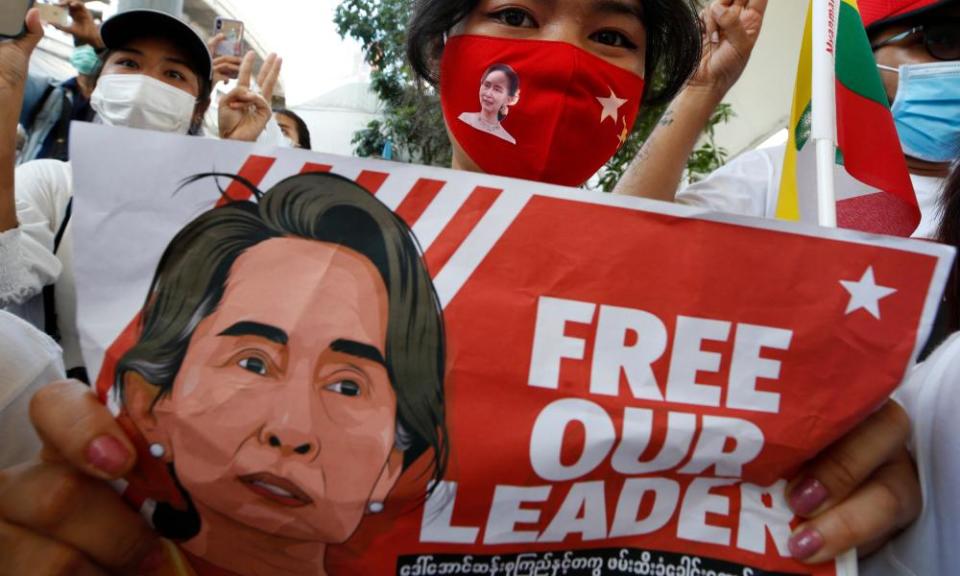Aung San Suu Kyi faces four charges as Myanmar junta cracks down on dissent

A court in Myanmar has announced two new charges against Aung San Suu Kyi, including one of sharing information “causing fear or alarm”, as the police and military stalked the streets and rounded up protesters in the country’s biggest city, Yangon.
A day after the bloodiest crackdown on anti-coup protesters since the military seized power, security forces used teargas and stun grenades to disperse crowds that continued to gather in Yangon. Officers went door-to-door on side streets, raiding homes to search for people suspected of taking part in rallies.
More than 1,000 people have been detained since the military seized power on 1 February, ousting the democratically elected government of Aung San Suu Kyi. She has not been seen in public since, but appeared before the court via video link on Monday.
Aung San Suu Kyi faces a total of four legal cases, including a charge under a section of the country’s colonial-era penal code, which forbids the circulation of any statement that is likely to cause “fear or alarm to the public”, Khin Maung Zaw, one of her lawyers, told the Guardian. The charge apparently relates to an announcement released by the committee representing elected politicians, which urged embassies not to work with the military junta.
A further charge was also added under a telecommunications law, he said. The next hearing is scheduled for 15 March.
Khin Maung Zaw said only one member of the legal team was able to see Aung San Suu Kyi during the video conference, and that they reported she appeared healthy, but may have lost weight.
Aung San Suu Kyi was already accused of possession of illegally imported walkie-talkies, and of violating the country’s natural disaster management law by breaching coronavirus restrictions. If convicted, she may be prevented from running in future elections.
“Right now, things are not proceeding in an orderly way or with common sense,” said Khin Maung Zaw. “She hasn’t even been able to meet us [the lawyers], which is both a legal requirement and her right as a human being,” he said.
The court hearing on Monday came after a day of violence across Myanmar on Sunday, when security forces used lethal force on peaceful protesters, firing live ammunition at crowds in several towns and cities. Stun grenades, rubber bullets and teargas were also deployed by police, backed up by military troops.
At least 18 people were killed in the violence, according to UN estimates, and 30 injured. Hundreds of people were arrested over the weekend, including many medics.
Protests on Monday were much smaller than on Sunday, although in Yangon, hundreds turned out on Insein Road near Hledan, where police set off stun grenades, fired teargas and pursued protesters in a cat-and-mouse chase.
Demonstrators raced to seek safety in nearby houses, but officers marched through surrounding roads, searching for anyone in hiding. In downtown Yangon, one street was sealed off by five truckloads of soldiers and police, as men in civilian clothing led troops to an apartment where they believed two civil society activists were staying.
Police broke into the building, reportedly holding a photograph of the couple, who were not home.
Social media footage showed officers setting off what appeared to be stun grenades, as they combed the streets.
Elsewhere, security forces removed makeshift barricades that had been assembled by protesters to slow down police. Officers, who held what appeared to be automatic weapons, stood guard as the roadblocks were pulled apart.
Several governments including the US and UK expressed outrage at the killings, and the UN secretary general, António Guterres, urged the international community to “send a clear signal to the military that it must respect the will of the people of Myanmar as expressed through the election and stop the repression”.
In a statement published in the state-run Global New Light of Myanmar newspaper, the foreign ministry said the junta was “exercising utmost restraint to avoid the use of force in managing the violent protests”.
Foreign ministers from the Association of Southeast Asian Nations will hold a video meeting on Myanmar on Tuesday and “listen to the representative of the Myanmar military authorities”, Singapore’s foreign minister, Vivian Balakrishnan, told parliament.
Balakrishnan called for the security forces to desist from the use of lethal force, for Aung San Suu Kyi’s release and for talks on solutions and a way back to democratic transition.
Tom Andrews, the UN special rapporteur on human rights in Myanmar, said it was clear the junta would continue its assault on the people, and that the international community should ratchet up its response. “Without concerted, coordinated international action to support the people of Myanmar in their time of greatest need, the nightmare that is unfolding before our eyes will get worse,” he said.
He proposed a global arms embargo, targeted sanctions from more countries on those behind the coup and on the military’s businesses, and a UN security council referral to the international criminal court.
“Words of condemnation are welcome but insufficient. We must act,” Andrews said in a statement.
The NLD won a landslide election victory last year, but the army has refused to accept the results and has alleged widespread voter fraud – a claim that is not substantiated.
A committee representing elected officials declared the military State Administration Council, the official name for the junta, a terrorist group on Monday, citing “atrocities and acts of terrorism”.

 Yahoo Finance
Yahoo Finance 